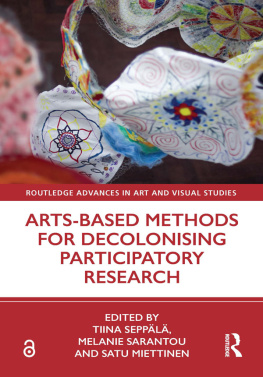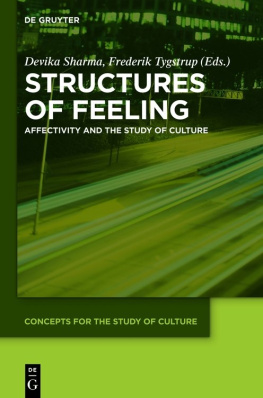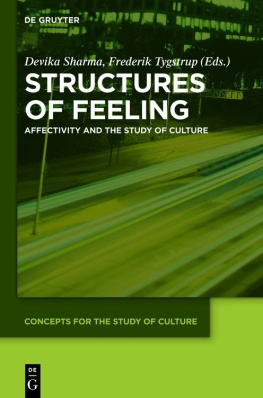AFFECTIVITY AND THE SOCIAL BOND
Rethinking Classical Sociology
Series Editor: David Chalcraft, University of Derby, UK
This series is designed to capture, reflect and promote the major changes that are occurring in the burgeoning field of classical sociology. The series publishes monographs, texts and reference volumes that critically engage with the established figures in classical sociology as well as encouraging examination of thinkers and texts from within the ever-widening canon of classical sociology. Engagement derives from theoretical and substantive advances within sociology and involves critical dialogue between contemporary and classical positions. The series reflects new interests and concerns including feminist perspectives, linguistic and cultural turns, the history of the discipline, the biographical and cultural milieux of texts, authors and interpreters, and the interfaces between the sociological imagination and other discourses including science, anthropology, history, theology and literature.
The series offers fresh readings and insights that will ensure the continued relevance of the classical sociological imagination in contemporary work and maintain the highest standards of scholarship and enquiry in this developing area of research.
Also in the series:
Max Webers Comparative-Historical Sociology Today
Major Themes, Mode of Causal Analysis, and Applications
Stephen Kalberg
ISBN 978-1-4094-3223-4
The Social Thought of Talcott Parsons
Methodology and American Ethos
Uta Gerhardt
ISBN 978-1-4094-2767-4
Transatlantic Voyages and Sociology
The Migration and Development of Ideas
Edited by Cherry Schrecker
ISBN 978-0-7546-7617-1
For more information on this series, please visit www.ashgate.com
Affectivity and the Social Bond
Transcendence, Economy and Violence in French Social Theory
TIINA ARPPE
University of Helsinki, Finland
ASHGATE
Tiina Arppe 2014
All rights reserved. No part of this publication may be reproduced, stored in a retrieval system or transmitted in any form or by any means, electronic, mechanical, photocopying, recording or otherwise without the prior permission of the publisher.
Tiina Arppe has asserted her right under the Copyright, Designs and Patents Act, 1988, to be identified as the author of this work.
Published by
Ashgate Publishing Limited
Wey Court East
Union Road
Farnham
Surrey, GU9 7PT
England
Ashgate Publishing Company
110 Cherry Street
Suite 3-1
Burlington, VT 05401-3818
USA
www.ashgate.com
British Library Cataloguing in Publication Data
A catalogue record for this book is available from the British Library
The Library of Congress has cataloged the printed edition as follows:
Arppe, Tiina.
Affectivity and the social bond : transcendence, economy and violence in French social theory / by Tiina Arppe.
pages cm. -- (Rethinking classical sociology)
Includes bibliographical references and index.
ISBN 978-1-4094-3182-4 (hardback) -- ISBN 978-1-4094-3183-1 (ebook) -- ISBN 978-1-4724-0313-1 (epub) 1. Social sciences--France--History--19th century. 2. Social sciences--France--History--20th century. I. Title.
H53.F7A77 2014
300.1--dc23
2013027936
ISBN: 978-1-4094-3182-4 (hbk)
ISBN: 978-1-4094-3183-1 (ebk-PDF)
ISBN: 978-1-4724-0313-1 (ebk-ePUB)
Contents
Acknowledgements
My interest in French social theory is long-standing and shared by a group of colleagues, nowadays working mainly in the University of Helsinki but also in other, completely non-academic settings, with whom Ive had the great fortune to read and to discuss the important works of the French scene over the years of this heterogeneous bunch I especially want to mention Elisa Heinmki, Ilpo Heln, Timo Kaitaro, Turo-Kimmo Lehtonen, Hannu Sivenius, Sami Santanen, Olli Sinivaara and Pekka Sulkunen, whose insight and erudition have been of great inspiration along the way. I am particularly indebted to Susanna Lindberg whose perceptive and thoughtful comments on the critical points of the manuscript helped me to see my way through when working with the final version of the manuscript. Of my international colleagues a special thank you is due to Camille Tarot, an eminent expert on French sociology of religion, whose illuminating remarks and unending hospitality I have had the privilege of enjoying over the years.
The institutional actors that have made this book possible are The Academy of Finland which funded the project and allowed me to work for several years in relative peace a rare luxury in the academic world nowadays and The Department of Sociology of the University of Helsinki which offered me not only the working space and the facilities, but also the academic community without which no research would ever be possible. Of the other, more informal institutional settings from which this book has greatly benefitted, I would like to mention two: the Girard study group that assembled during the years 20112012, headed by the indefatigable Olli Sinivaara, and the Summer School of the Finnish Association of Researchers, headed by Kirsti Mttnen and Tuomas Nevanlinna for as long as memory goes one of the last informal settings of the civilized world in which the researchers of social sciences and humanities can meet, discuss The Fundamental Questions (the ones that really matter) and have fun all night long during a whole summer weekend.
I also want to thank my editors Neil Jordan and Aime Feenan from Ashgate without their patience and diligence, but also their invaluable help in the concrete copy-editing process, this book would probably never have seen daylight.
The last and the greatest thanks, however, goes to my daughter Kathleen who must have used every ounce of her creativity and sense of humour to support her absent-minded mother constantly bent over a book or a computer. No love should ever be put on such trial. This book is dedicated to her.
Introduction
Affectivity has become an important issue in sociology and social theory during recent decades. For example, an entire affective turn has been proclaimed,and which even nowadays characterize the discussion of the problem, albeit under the more positive label of interdisciplinarity. However, the form that the problem of affectivity took or the shape in which it was introduced to the emerging field of sociology also had its roots in the history of modern philosophy and political thought.
Schematically put, in the tradition of modern social and political theory human affectivity has been regarded from two different angles.
The same ambiguity between two different types of affectivity is repeated in modern political theory. The positive bond between men was ultimately based on sentiment (the postulate of the natural sociability of men, common in the social contract theories) whereas the relationship between passions and sociality was mostly seen in a negative manner: the basic motivation for the constitution of the political society is precisely mens desire to protect themselves from the destructive consequences of the passionate element equally implicit in their nature. This is the Hobbesian starting point of the modern political philosophy: in a hypothetical state of nature, preceding the formation of the political authority (or Leviathan, the mortal god), men free and equal by their capacities inevitably end into conflicts and rivalry over the objects of their desires, the result being
However, this strongly dualistic picture of human affectivity was nuanced during the following centuries. Already the emergence of
Next page





